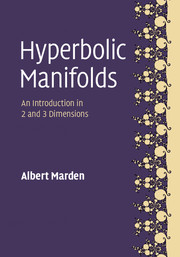Book contents
- Frontmatter
- Dedication
- Contents
- List of Illustrations
- Preface
- 1 Hyperbolic space and its isometries
- 2 Discrete groups
- 3 Properties of hyperbolic manifolds
- 4 Algebraic and geometric convergence
- 5 Deformation spaces and the ends of manifolds
- 6 Hyperbolization
- 7 Line geometry
- 8 Right hexagons and hyperbolic trigonometry
- Bibliography
- Index
4 - Algebraic and geometric convergence
Published online by Cambridge University Press: 05 January 2016
- Frontmatter
- Dedication
- Contents
- List of Illustrations
- Preface
- 1 Hyperbolic space and its isometries
- 2 Discrete groups
- 3 Properties of hyperbolic manifolds
- 4 Algebraic and geometric convergence
- 5 Deformation spaces and the ends of manifolds
- 6 Hyperbolization
- 7 Line geometry
- 8 Right hexagons and hyperbolic trigonometry
- Bibliography
- Index
Summary
The focus of this chapter is on sequences of kleinian groups, typically sequences that are becoming degenerate in some way. For these, it is necessary to distinguish between convergence of groups and convergence of quotient manifolds. The former has to do with sequences of groups whose generators converge, the latter with sequences of groups whose fundamental polyhedra converge.
We will continue on by introducing the operations called Dehn filling and surgery. This leads to the description of the set of volumes of finite volume hyperbolic 3-manifolds.
Algebraic convergence
In this section we will prove the two theorems which provide the basis for working with sequences of groups.
Let Γ be an abstract group and {φn : Γ → Gn} be a sequence of homomorphisms (also called representations) {φn} of Γ to groups Gn of Möbius transformations. Suppose for each γ ∈ Γ, limn→∞φn(γ) = φ(γ) exists as a Möbius transformation. Then the sequence {φn} is said to converge algebraically and its algebraic limit is the group of limits G∞ = {φ(γ) : γ ∈ Γ}. When we say a sequence of groups converges algebraically, we are assuming that behind the statement is a sequence of homomorphisms or isomorphisms spawning the sequence.
In particular, a sequence of r-generator groups Gn = ⟨A1,n, A2,n, … Ar,n⟩ is said to converge algebraically if Ak = limn→∞ Ak,n exists as a Möbius transformation, 1 ≤ k ≤ r. Its algebraic limit is the group G = ⟨A1, A2, … Ar⟩. To make this terminology consistent with that used above, refer to the free group Fr on r-generators and express Gn as the sequence of representations φn : Fr → Gn determined by sending the k-th generator of Fr to Ak,n.
The convergence is controlled as spelled out by the following two fundamental results.
Theorem 4.1.1 [Jørgensen 1976; Jørgensen and Klein 1982]. Let {Gn} be a sequence of r-generator nonelementary kleinian groups converging algebraically to the group G. Then G is also a nonelementary kleinian group, and the map Ak → Ak,n, 1 ≤ k ≤ r, determines a homomorphism ϕn : G → Gn for all large indices n.
In general ϕn will not be an isomorphism.
- Type
- Chapter
- Information
- Hyperbolic ManifoldsAn Introduction in 2 and 3 Dimensions, pp. 219 - 275Publisher: Cambridge University PressPrint publication year: 2016



